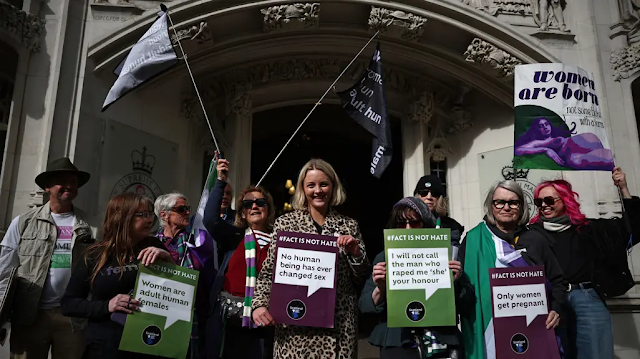Wednesday, April 16, 2025 - The United Kingdom’s Supreme Court has ruled that the legal definition of "woman" under the Equality Act 2010 refers specifically to biological sex, effectively excluding trans women from this classification in key areas of the law.
In a unanimous judgment, the court held that the terms
"woman" and "sex" in the Equality Act refer to biological
women, sparking celebration among gender-critical campaigners and deep concern
among trans rights advocates.
The case, brought by campaign group For Women Scotland,
challenged Scottish government guidance that included trans women with Gender
Recognition Certificates (GRCs) under the legal definition of women. The group
argued this interpretation could erode the rights of biological women in
single-sex spaces such as changing rooms, hostels, and women-only shortlists.
Outside the court, Susan Smith and Marion Calder of For Women
Scotland hailed the decision as a significant victory. Campaigners waved
placards and cheered as the ruling was delivered.
Delivering the verdict, Lord Patrick Hodge stated:
“The terms ‘woman’ and ‘sex’ in the
Equality Act 2010 refer to a biological woman and biological sex. Provisions
related to sex discrimination can only be interpreted through that lens.”
He further explained that interpreting “sex” to mean
“certificated sex” would conflict with other definitions within the law and
risk creating inconsistencies, particularly in contexts like pregnancy
protections and maternity leave. The ruling clarified that trans women can
still be protected from discrimination on the grounds of “gender reassignment”
under the Equality Act.
The UK’s Labour government welcomed the ruling, describing it
as offering “clarity and confidence” for service providers. Meanwhile, the
opposition Conservatives called it “a clear victory for common sense” and urged
the government to revise guidance to reflect the judgment.
“This ruling brings clarity and
confidence for women and service providers such as hospitals, refuges, and
sports clubs,” a government spokesperson said. “Single-sex spaces are protected
in law and will continue to be protected by this government.”
Campaign group Sex Matters stated:
“The court has given the right
answer. The protected characteristic of sex—male and female—refers to reality,
not paperwork.”
Similarly, the LGB Alliance hailed the ruling as a “watershed
moment for women’s rights.” Former Scottish National Party MP Joanna Cherry, a
vocal critic of gender self-identification, called the verdict “hugely
vindicating,” urging lawmakers to ensure legal compliance.
Trans rights organizations responded with alarm. LGBTQ+
charity Stonewall described the ruling as “deeply worrying for the trans
community,” warning it may fuel further marginalization.
Scottish Trans, an advocacy group, advised the community to
stay calm and cautious in the face of widespread media coverage.
“There
will be a lot of commentary that may overstate the impact of this decision. We
urge trans people to look out for themselves and one another today,” the group
wrote on social media.
Trans activists globally have voiced
concern about the erosion of their rights amid rising hostility. In the UK,
hate crimes based on gender identity surged by 112% in 2023. That same year,
the brutal murder of 16-year-old trans girl Brianna Ghey by two schoolchildren
sent shockwaves across the country.








0 Comments